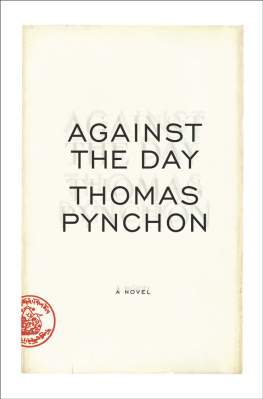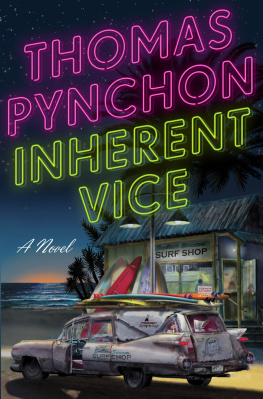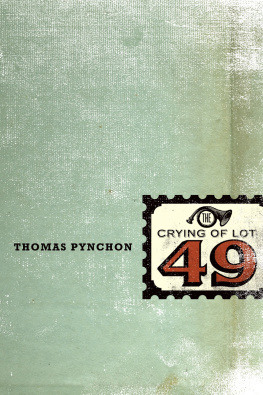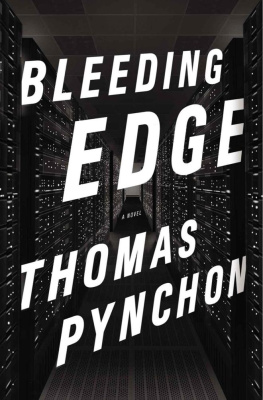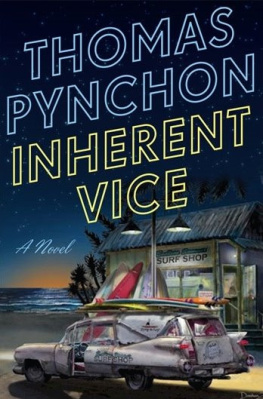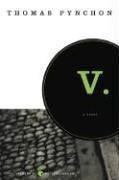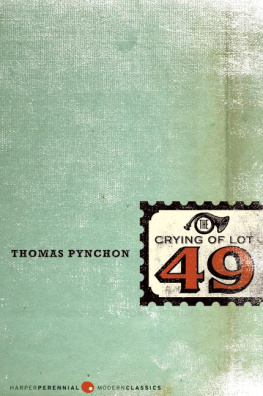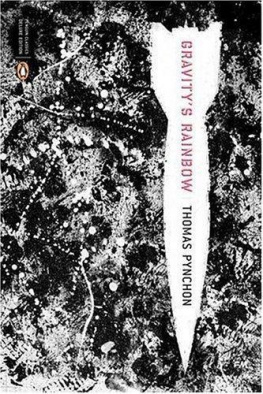Pynchon - The Crying Lot of 49
Here you can read online Pynchon - The Crying Lot of 49 full text of the book (entire story) in english for free. Download pdf and epub, get meaning, cover and reviews about this ebook. genre: Detective and thriller. Description of the work, (preface) as well as reviews are available. Best literature library LitArk.com created for fans of good reading and offers a wide selection of genres:
Romance novel
Science fiction
Adventure
Detective
Science
History
Home and family
Prose
Art
Politics
Computer
Non-fiction
Religion
Business
Children
Humor
Choose a favorite category and find really read worthwhile books. Enjoy immersion in the world of imagination, feel the emotions of the characters or learn something new for yourself, make an fascinating discovery.

- Book:The Crying Lot of 49
- Author:
- Genre:
- Rating:4 / 5
- Favourites:Add to favourites
- Your mark:
- 80
- 1
- 2
- 3
- 4
- 5
The Crying Lot of 49: summary, description and annotation
We offer to read an annotation, description, summary or preface (depends on what the author of the book "The Crying Lot of 49" wrote himself). If you haven't found the necessary information about the book — write in the comments, we will try to find it.
The Crying Lot of 49 — read online for free the complete book (whole text) full work
Below is the text of the book, divided by pages. System saving the place of the last page read, allows you to conveniently read the book "The Crying Lot of 49" online for free, without having to search again every time where you left off. Put a bookmark, and you can go to the page where you finished reading at any time.
Font size:
Interval:
Bookmark:
The Crying Lot of 49
one summer afternoon Mrs Oedipa Maas came home from a Tupperware party whose hostess had put perhaps too much kirsch in the fondue to find that she, Oedipa, had been named executor, or she supposed executrix, of the estate of one Pierce Inverarity, a California real estate mogul who had once lost two million collars in his spare time but still had assets numerous and tangled enough to make the job of sorting it all out more than honorary. Oedipa stood in the living room, stared at by the greenish dead eye of the TV tube, spoke the name of God, tried to feel as
drunk as possible. But this did not work. She thought of a hotel room in Mazatlan whose door had just been slammed, it seemed forever, waking up two hundred birds down in the lobby; a sunrise over the library slope at Cornell University that nobody out on it had seen because the slope faces west; a dry, disconsolate tune from the fourth movement of the Bartok Concerto for Orchestra; a whitewashed bust of Jay Gould that Pierce kept over the bed on a shelf so narrow for it she'd always had the hovering fear it would someday topple on them. Was that how he'd died, she wondered, among dreams, crushed by the only ikon in the house? That only made her laugh, out loud and helpless: You're so sick, Oedipa, she told herself, or the room, which knew.
The letter was from the law firm of Warpe, Wist-full, Kubitschek and McMingus, of Los Angeles, and signed by somebody named Metzger. It said Pierce had died back in the spring, and they'd only just now found the will. Metzger was to act as co-executor and special counsel in the event of any involved litigation. Oedipa had been named also to execute the will in a codicil dated a year ago. She tried to think back to whether anything unusual had happened around then. Through the rest of the afternoon, through her trip to the market in downtown Kinneret-Among-The-Pines to buy ricotta and listen to the Muzak (today she came through the bead-curtained entrance around bar 4 of the Fort Wayne Settecento Ensemble's variorum recording of the Vivaldi Kazoo Concerto, Boyd Beaver, soloist); then through the sunned gathering of her marjoram and sweet basil from the herb garden, reading of book reviews in the latest Scientific American, into the layering of a lasagna, garlicking of a bread, tearing up of romaine leaves, eventually, oven on, into the mixing of the twilight's whiskey sours against the arrival of her husband, Wendell (Mucho) Maas from work, she wondered, wondered, shuffling back through a fat deckful of days which seemed (wouldn't she be first to admit it?) more or less identical, or all pointing the same way subtly like a conjurer's deck, any odd one readily clear to a trained eye. It took her till the middle of Huntley and Brinkley to remember that last year at three or so one morning there had come this long-distance call, from where she would never know (unless now he'd left a diary) by a voice beginning in heavy Slavic tones as second secretary at the Transyl-vanian Consulate, looking for an escaped bat; modulated to comic-Negro, then on into hostile Pachuco dialect, full of chingas and maricones; then a Gestapo officer asking her in shrieks did she have relatives in Germany and finally his Lamont Cranston voice, the one he'd talked in all the way down to Mazatlan. Pierce, please, she'd managed to get in, I thought we had
But Margo, earnestly, I've just come from Commissioner Weston, and that old man in the fun house was murdered by the same blowgun that killed Professor Quackenbush, or something.
For God's sake, she said. Mucho had rolled over and was looking at her.
Why don't you hang up on him, Mucho suggested, sensibly.
I heard that, Pierce said. I think it's time Wendell Maas had a little visit from The Shadow. Silence, positive and thorough, fell. So it was the last of his voices she ever heard. Lamont Cranston. That phone line could have pointed any direction, been any length. Its quiet ambiguity shifted over, in the months after the call, to what had been revived: memories of his face, body, things he'd given her, things she had now and then pretended not to've heard him say. It took him over, and to the verge of being forgotten. The shadow waited a year before visiting. But now there was Metzger's letter. Had Pierce called last year then to tell her about this codicil? Or had he decided on it later, somehow because of her annoyance and Mucho's indifference? She felt exposed, finessed, put down. She had never executed a will in her life, didn't know where to begin, didn't know how to tell the law firm in L. A. that she didn't know where to begin.
Mucho, baby, she cried, in an access of helplessness.
Mucho Maas, home, bounded through the screen door. Today was another defeat, he began.
Let me tell you, she also began. But let Mucho go first.
He was a disk jockey who worked further along the Peninsula and suffered regular crises of conscience out his profession. I don't believe in any of it, Oed, he could usually get out. I try, I truly can't, way down there, further down perhaps than she could reach, so that such times often brought her near panic. It might have been the sight of her so about to lose control that seemed to bring him back up.
You're too sensitive. Yeah, there was so much else she ought to be saying also, but this was what came out. It was true, anyway. For a couple years he'd been a used car salesman and so hyperaware of what that profession had come to mean that working hours were
exquisite torture to him. Mucho shaved his upper lip every morning three times with, three times against the grain to remove any remotest breath of a moustache, new blades he drew blood invariably but kept at it; bought all natural-shoulder suits, then went to a tailor to have the lapels made yet more abnormally narrow, on his hair used only water, combing it like Jack Lemmon to throw them further off. The sight of sawdust, even pencil shavings, made him wince, his own kind being known to use it for hushing sick transmissions, and though he dieted he could still not as Oedipa did use honey to sweeten his coffee for like all things viscous it distressed him, recalling too poignantly what is often mixed with motor oil to ooze dishonest into gaps between piston and cylinder wall. He walked out of a party one night because somebody used the word creampuff, it seemed maliciously, in his hearing. The man was a refugee Hungarian pastry cook talking shop, but there was your Mucho: thin-skinned.
Yet at least he had believed in the cars. Maybe to excess: how could he not, seeing people poorer than him come in, Negro, Mexican, cracker, a parade seven days a week, bringing the most godawful of trade-ins: motorized, metal extensions of themselves, of their families and what their whole lives must be like, out there so naked for anybody, a stranger like himself, to look at, frame cockeyed, rusty underneath, fender repainted in a shade just off enough to depress the value, if not Mucho himself, inside smelling hopelessly of children, supermarket booze, two, sometimes three generations of cigarette smokers, or only of dust and when the cars were swept out you had to look at the actual residue of these lives, and there was no way of
telling what things had been truly refused (when so little he supposed came by that out of fear most of it had to be taken and kept) and what had simply (perhaps tragically) been lost: clipped coupons promising savings of .05 or .10, trading stamps, pink flyers advertising specials at the markets, butts, tooth-shy combs, help-wanted ads, Yellow Pages torn from the phone book, rags of old underwear or dresses that already were period costumes, for wiping your own breath off the inside of a windshield with so you could see whatever it was, a movie, a woman or car you coveted, a cop who might pull you over just for drill, all the bits and pieces coated uniformly, like a salad of despair, in a gray dressing of ash, condensed exhaust, dust, body wastes it made him sick to look, but he had to look. If it had been an outright junkyard, probably he could have stuck things out, made a career: the violence that had caused each wreck being infrequent enough, far enough away from him, to be miraculous, as each death, up till the moment of our own, is miraculous. But the endless rituals of trade-in, week after week, never got as far as violence or blood, and so were too plausible for the impressionable Mucho to take for long. Even if enough exposure to the unvarying gray sickness had somehow managed to immunize him, he could still never accept the way each owner, each shadow, filed in only to exchange a dented, malfunctioning version of himself for another, just as futureless, automotive projection of somebody else's life. As if it were the most natural thing. To Mucho it was horrible. Endless, convoluted incest.
Font size:
Interval:
Bookmark:
Similar books «The Crying Lot of 49»
Look at similar books to The Crying Lot of 49. We have selected literature similar in name and meaning in the hope of providing readers with more options to find new, interesting, not yet read works.
Discussion, reviews of the book The Crying Lot of 49 and just readers' own opinions. Leave your comments, write what you think about the work, its meaning or the main characters. Specify what exactly you liked and what you didn't like, and why you think so.

